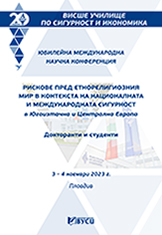Изследване на рисковете пред етнорелигиозния мир в Югоизточна и Централна Европа: взаимодействие между държавната политика, етническите отношения и националната и международната сигурност
Exploring the Risks to Ethno-Religious Peace in Southeast and Central Europe: Interplay between State Policy, Ethnic Relations and National and International Security
Author(s): Georgi Minkov Minkov
Subject(s): Human Rights and Humanitarian Law, Theology and Religion, Security and defense, Inter-Ethnic Relations, History of Religion, Politics and Identity, Identity of Collectives, Peace and Conflict Studies, Asylum, Refugees, Migration as Policy-fields
Published by: Висше училище по сигурност и икономика (ВУСИ)
Keywords: ethnic conflicts; religious tensions; historical roots; ethnic minorities; migration and refugees; regional stability; state policy; peacekeeping efforts; conflict prevention tools; security; diplomac
Summary/Abstract: The region of South-Eastern and Central Europe faces a number of certain risks that are closely related to ethnic and religious factors. The historical conflicts that underlie many of these risks include territorial disputes, cultural differences and identity. These conflicts often affect regional stability and security, manifesting in violence, terrorism and human rights violations. The presence of diverse ethnic minorities in the region and intense migration flows present additional security challenges. State policy has a key role in managing these issues, striving for integration and promoting ethnic coexistence. Religious communities in the region can also influence security. Their role in interfaith dialogue and relations with state institutions can help or destabilize stability.
- Page Range: 92-96
- Page Count: 5
- Publication Year: 2024
- Language: English, Bulgarian
- Content File-PDF

